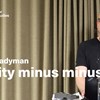pots
Mike Otsuka: How to guard against the risk of living too long: the case for collective pensions
Mike (Michael) Otsuka, Professor of Philosophy at London School of Economics ABSTRACTIn this paper, I defend the realization here and now of a type of occupational pension that is collective rather tha
Excluding Citizens: Belongership and the Constitutional Demos in British Overseas Territories
Ethnopolitics Abstract Previous literature explains the fact that sub-national elections tend to be more inclusive than national elections by reference to the level of the election. This paper argues th
IF starts a blog
The Institute for Futures Studies now has a blog named Framtider (Futures), a name it has inherited from a magazine that was previously published by the Institute. On this blog you will find posts on
Subscribe with Outlook
Instructions for subscribing to IFFS calendar with your Outlook account. Log in to Outlook Kalender. Click on Add calendar and choose From internet: A screen pops up to the right of the screen, add the fo
Information dynamics shape the sexual networks of Internet-mediated prostitution
2010. Proc Natl Acad Sci U S A 107:5706-5711. Abstract Like many other social phenomena, prostitution is increasingly coordinated over the Internet. The online behavior affects the offline activity; the r
Pitcovski’s explanation-based account of harm
Philosophical Studies Abstract In a recent article in this journal, Eli Pitcovski puts forward a novel, explanation-based account of harm. We seek to show that Pitcovski’s account, and his arguments in
Ghost Platform at September Sessions: Dirty details of the clean startup chime
Place: Institute for Futures Studies, 4th floor, Holländargatan 13, 111 36 Stockholm Listening Session And Drinks The Institute for Futures Studies hosts the premiere of a new 15-minute sound work. Regist
Transformative Experience and the Shark Problem
Philosophical Studies Abstract In her ground-breaking and highly influential book Transformative Experience, L.A. Paul makes two claims: (1) one cannot evaluate and compare certain experiential outcomes evaluate and compare certain intuitively horrible outcomes (e.g. being eaten alive by sharks) as bad and worse than certain other outcomes even if one cannot grasp what these intuitively horrible outcomes are like. We argue that the conjunction of these two claims leads to an implausible discontinuity in the evaluability of outcomes. One implication of positing such a discontinuity is that evaluative comparisons of outcomes will not be proportionally sensitive to variation in the underlying features of these outcomes. This puts pressure on Paul to abandon either (1) or (2). But (1) is central to her view and (2) is very hard to deny. We call this the Shark Problem.

Reality minus minus - James Ladyman, Professor of Philosophy
There is plenty of techno-optimistic takes on virtual worlds. They will offer us opportunity for new and exciting experiences, as real as reality, it is said. But what about the costs? In a talk from
How religiosity is transmitted to new generations and what inequality has to do with it
Many things that we deeply care about are related to the topic of religion: gender norms, sexual morals, work ethics but also altruism, charity and community. It is therefore an important question to Contrary to what you might expect, religion continues to play an important role in countries all over the world, as the figure shows.








